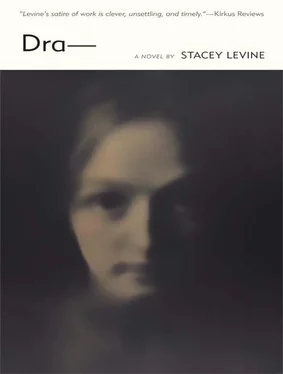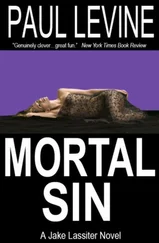“I know something about the Administrator,” Frida whispered, turning to look at Dra—. “She has a secret.”
“She didn’t tell me that,” Dra— said.
“Of course not!” Frida yelled, flushing. “But it’s true. There are other things that are true.”
“What is?”
“I’ll tell you, maybe,” said Frida, pulling her face very close, a scent of paste surrounding her. “The Administrator loves the pleasure of sadness. Do you understand?”
“Not really.”
“Well, I understand it quite well,” Frida said assuredly. “She argued with Peter, and then she said to another Administrator, Miss Ulrich, that she was the most terrible mass of raw emotion, and that it all had to do with Miss Ulrich and Peter both and that it was unnatural.”
“Who is Peter?” asked Dra— with distress.
“Then they talked about the pleasures of sadness, just as I expected they would,” said Frida breezily. “It’s all disturbing, do you see? Our Administrator wants us to long for her, that gives her the best pleasure. Do you know why?”
“No.”
“Oh, I can’t be bothered to explain it, but it has to do with conflicts by the dozen and never getting enough from loved ones.” Frida sniffed. “Maybe sometimes at night she just gets so passionate about everything, about Peter and Miss Ulrich and her mother until she, you know, just explodes! That’s how some people have fun,” Frida finished dryly.
“Who is Peter?”
“Oh, nuts to you.” Frida wrapped her arms around herself and closed her eyes. “People have all kinds of fun,” she intoned mysteriously. “Someday, I’m going to write a book about our lives, and in it, I will talk about pining and pleasure — and electric motors, too.”
“Maybe you won’t write a book at all,” Dra— said with sudden irritation.
“I will! If I say I will, I will!” Frida grabbed Dra—’s upper arm. “And I will be as frank with you as I like, do you understand?”
“Yes.”
“I don’t think you do. Pleasure is unbearable: you’ll see how we must endure it. Love weakens pleasure — I heard them saying that, too — in the mailroom.” Frida turned again to the wall, and finding a small wen there, dug her fingers into it, grunting.
“Why?” Dra— asked. “Why did they say that?”
“What do you care?” Frida smiled. “Me, I’m almost always alone, thinking about fire and poison and a thousand ways to die. Do you think we’re immortal? I don’t. But there’s a little thrill in believing we are. ‘Who cares?’ is what I say. I only hope that when I die someone will be sitting next to me, that they won’t have gone into the kitchen.” Grimly, she kicked one of the doors hard, and it opened.
“Oh, wouldn’t a small, neat bathroom be much better than this one?” Frida said, voice disappointed and echoing wildly, for indeed, the room was as large as a gymnasium, misty and bare, with toilets along the far wall in a row so long it faded from sight, and in the corner nearest them sat a small, neat office.
Next to the office was a special type of toilet that appeared to be able to fold out from the wall in any number of configurations so that users might position themselves according to desire. Nearby, a few heavy ropes hung from the ceiling and gently brushed the floor.
“You might think my opinions are troubling and perhaps they are,” Frida said, sniffing as they stood in the bathroom’s humid, silent vestibule. “But I’m a deep thinker. Are you?”
“I think in my sleep. My thoughts move in order.”
“Oh. Well,” Frida said with a glance, “I’m older, educated by school, so I am aware of all the awful things there are to be afraid of. The young don’t know about these things.”
“Some imagine awful things anyway!”
“Naturally they do. Oh,” Frida said, looking around, spreading her hands, “isn’t the air wonderful to breathe in a quiet room like this? Sometimes it’s just good to breathe for a few moments before using the toilet, don’t you agree? Did you see anything floating in the bowls?” she added worriedly.
“No.”
“Good,” was the reply, and together they approached the row of toilets, their footsteps echoing around them, Frida whimpering as Dra— leaned to one of the toilets and delicately opened its enormous lid with her fingertips, a task that drained her so terribly that afterward she sank to the floor to rest.
“I want to see the future,” Frida whispered. “I want to know how and when I will die, is that so terrible?”
“I don’t want to know,” she responded.
“I’ll bet you do! Deep down, I’m sure you’d like to know how you’ll die. Do you feel like every drop of pleasure you experience brings you closer to death? I do. I’d like to see the world in a thousand years when there’s nothing left but rubble and little pieces of plastic everywhere, wouldn’t that be the best revenge?”
“Revenge for what?”
Frida only laughed. “Are you an optimist or a pessimist?”
“Well,” Dra— said slowly, “I’m nothing, I suppose.”
“Yes!” screamed Frida, pulling Dra— to her feet. “Yes! That’s just what I am! I’m nothing! Sometimes I wait all day at school to realize that I’m nothing, and that nothing will ever happen to me! Do you? When I imagine all sorts of musty little pathways leading us to a better life, I get a little sick! I hate school! Even when I wear a suit with a sweater underneath I feel unprotected, do you? I’m sick of pretending to have a grand time! I can’t remember the first half of my life, but what of it?” Frida hid her face, beginning to cry. “Do you have a charm bracelet?” she asked meekly through her hands.
Dra— answered inaudibly as Frida cried for a while, loudly, as if with relish. Finally, sniffing, Frida asked: “Are you ill?”
“No.”
“Yes, you are. Who isn’t? You’re ill; you’re filled with poison; you’ll lose your hair and die like everyone else. There’s nothing we can do to stop it, short of a long-range revolt against the way things are!”
Dra— answered: “Then you’re no different — you’ll get sick too!” and Frida knelt and cried weakly against the wall.
They remained silent for long minutes near the toilets, hearing, from far away, a few trepid clicks like the footsteps of someone about to come forth. Frida raised her head and whispered intensely, “If you think your body is conspiring against you, you’re probably right, that’s what bodies do. And if you assume someone is conspiring against you, they’re probably not, but if you ask them about it, they’ll trick you by saying they are.” She sighed. “An hour before I met you I got a little sick, but no throw-up,” she confessed morosely.
Frida blew her nose into a small handkerchief and glanced around the room. “Stay with me while I use the toilet, won’t you? I can’t wait any more.” She looked at Dra—. “Do you have to go too?”
Though admitting so seemed an enormous compromise of integrity, Dra— nodded; and at the sight of Frida tearing down her underwear, she winced, saying, “Yes!” and together the two rushed to the toilets, groaning.
For long minutes they sat, side by side on the row of toilets, heads down, breathing as the light from the room’s opaque windows seemed to fade, and a different time of day to ensue. Presently, Dra— looked up to survey Frida’s back, entirely bare, for in the frenzy, Frida had torn her uniform away, and also her shoes, so that she now sat stiffly, uncomfortably, lip jutted, uniform bunched in her lap.
“My mother has gone away,” she whispered straight ahead of her, “to Hungary, and I’m not sad, I’m not glad, I’m not anything at all. I have no opinion on the subject, in other words, so don’t bother asking me about it.”
Читать дальше












